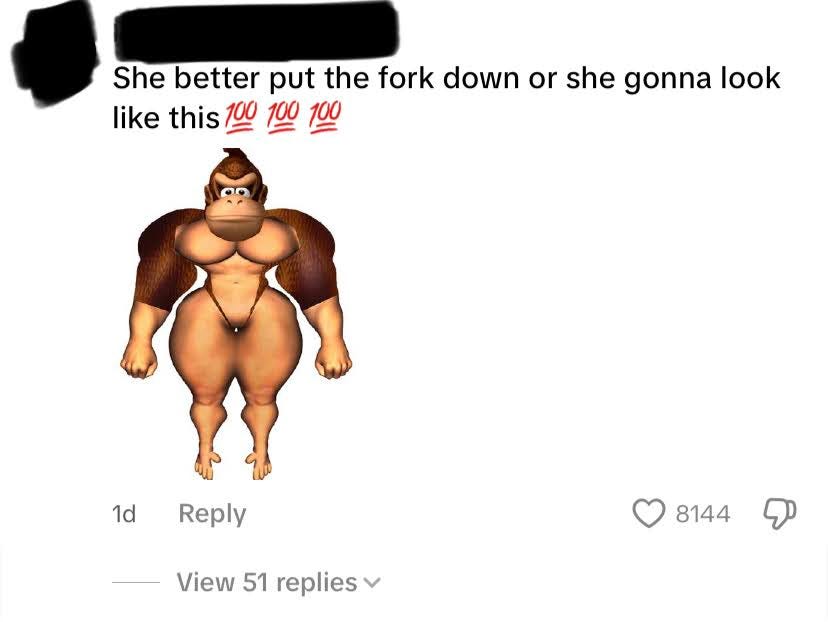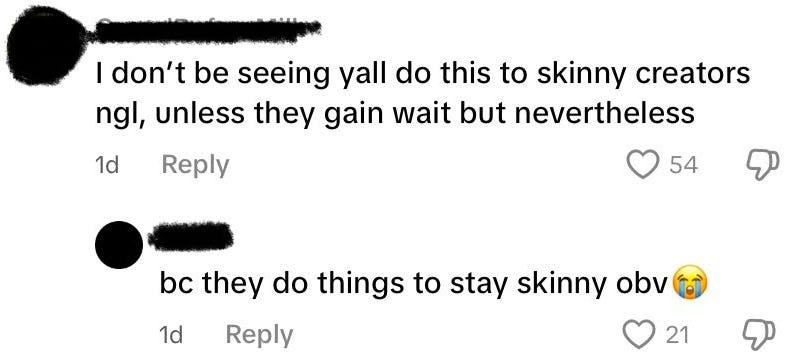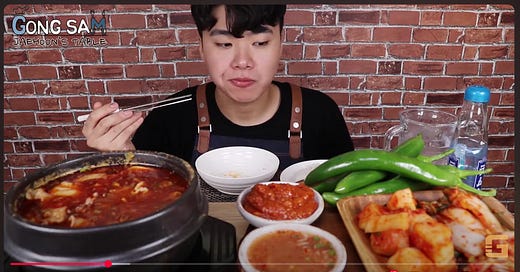"Big-Back" Phobia and the Demonization of Mukbangs
A once viral internet niche has become the target of 'health' controversy
My dearest readers,
Believe it or not, I have not forgotten the password to my account.
I am back to tell you that next month, July, we will be talking about mukbangs.
When I was a teenager struggling with loneliness and eating issues, I found solace in online videos called "mukbangs." These videos featured other people--total strangers to me--eating complex, delicious foods. The portions varied from average to large; the foods ranged from dry to saucy. Sometimes, the mukbanger (the person conducting the mukbang) would be silent, leading only with the sound of their chewing. Other times, the mukbanger indulged their eating companion (the viewer) with conversation. They would share stories from their personal life, explain how their day was going, or describe in detail what they liked or disliked about their meal.
Mukbangs were helpful to younger me. In an unexplainable way, they made eating more comfortable, more sociable, more permissible. In my research, I've found that this is one intended purpose of the community. Potentially stemming from the rise of single-person households in Korea, mukbang--a shortened form of the Korean words meongneun and bangsong--served to comfort people living alone who were accustomed to communal meals.
It's been years since I was one of those people finding comfort in digital eating. The last I saw the community, it was in relatively good standing with the public. It became mainstream, with celebrities, influencers, and netizens alike participating.
Imagine my surprise when I recently noticed a shift in favor. While mukbangs have never been 100% accepted by the general population (thanks, in part, to rage-baiting creators becoming the face of it) recent backlash has been especially potent. TikTok users are reacting to mukbang videos with malice; decrying the state of public health, accusing people of being "nasty gluttons," and struggling to come to terms with a so-called "Big-Back epidemic” (this is just fatphobia repackaged for the younger generation).

Truthfully, mukbangs can be melodramatic. Some creators eat very saucy, sugared, or gimmicky foods, often in portions deemed excessive. In my research, I've seen people eat candied Chipotle burritos, a cookie the size of a head (with small cookies baked in for added effect), and towering stacks of fast food items. Whether the creator eats all of the food is highly contested. More often than not, the videos on TikTok cut before the full meal is consumed. On YouTube, there's often leftovers remaining as the mukbanger does their outro. Do a little digging and you’ll find that most creators save the rest for later, share it with people they know, or, controversially, spit out food between takes.
Either way, the response to mukbangs is equally melodramatic. While there are valid concerns raised every now and then, most discourse tends to fall into maddening circles about weight, race, class, health, and desirability. Creators of certain identities are bashed more than others. There even seems to be a growing conservative tinge to the conversation.

This is a complex topic, the likes of which I could never fully represent in a video essay, let alone a newsletter preceding one, but I would love to hear your thoughts!
General questions to consider, if you need guidance:
Do you watch mukbangs? Do you enjoy them? Why or why not?
What does it mean to be healthy, in society at large and on an individual level? How do you define health?
Do you have easy access to fresh groceries? How far is your local grocery store? Are you rural or do you live in a city?
What is your experience as a fat person living in a fatphobic society? How do you feel about the rise and normalization of "big-back" jokes?
If you live outside of the US: what preconceptions do you have about American food? Does it come in large portions, is it too sweet, too salty, etc?
Small note: the email I usually use for newsletter responses has now changed. For a chance to have your submission read in the upcoming video, please email your thoughts to tragedyoferrorsnewsletter@gmail.com by June 22, 2025, 11:59 p.m. EST!
Keep in mind that submissions are automatically classified as “anonymous” unless you explicitly state permission for your name to be read out loud! (For example: Hi, my name is [blank] and I give you permission to use my name in your video!) Video submissions and audio submissions are more than welcome!
Can't wait to hear from you!
Shanspeare x





i wish binge eaters were given the same empathy and compassion anorexic people are shown, most people i’ve met who struggle with BED eat low quality/cheap foods and feel a deep sense of guilt for every relapse.
oh... to answer question four, i certainly hear a lot of unpleasant language surrounding food and weight when i'm with my "straight-sized" friends. when we're eating at a restaurant, someone might be teased for finishing their food completely. or someone will call themselves a "big back" (or similar remarks) for finishing food themselves. recently, i did a group painting project of a dragon. in the sketching stages, my groupmates would remark that the dragon looks "too fat" when it was drawn a bit larger than was planned. one time someone drew a line too thin and it was joked that it was "on ozempic". just, things like that. often. it makes me uncomfortable to hear and i wonder what they think *i* think. like, do they think about how it would make me feel? bluh... but still i don't say anything to them. :/